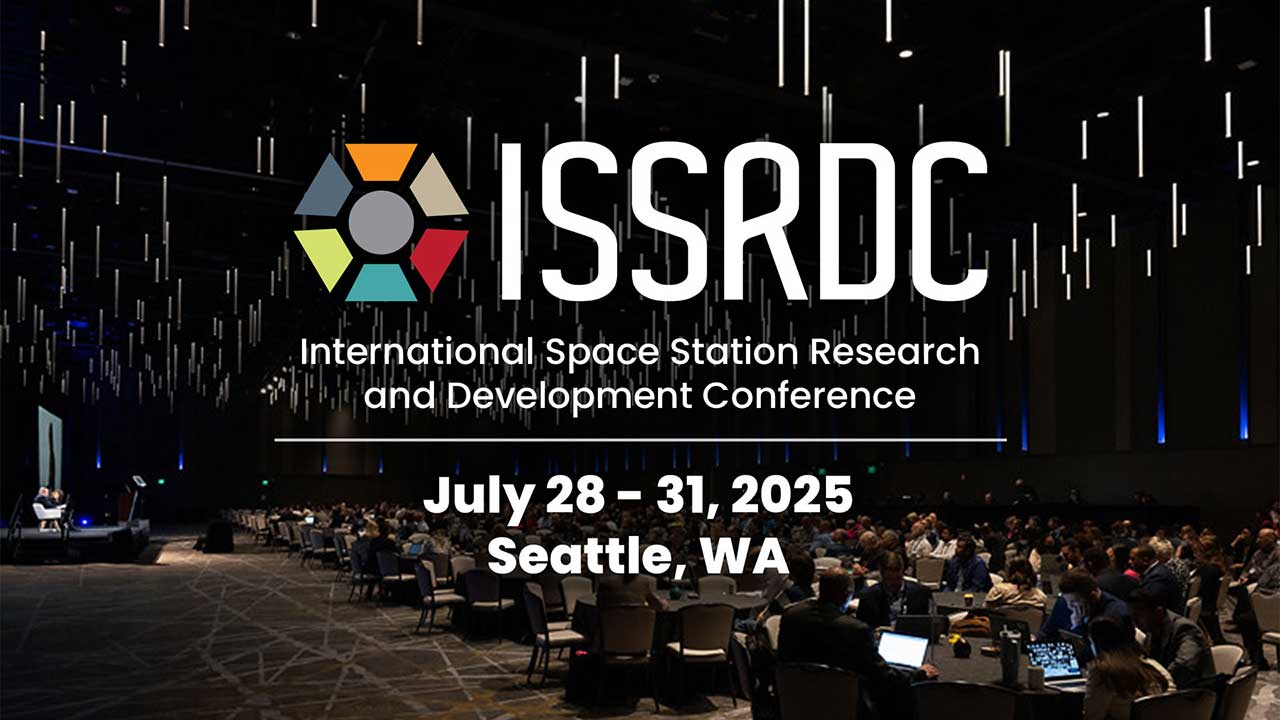Registration Opens for 2025 International Space Station Research and Development Conference in Seattle

ISSRDC takes place July 28-31; Register now for early bird pricing before it ends on May 23
April 3, 2025
SEATTLE (WA), April 3, 2025 – The countdown has begun for the 14th annual International Space Station Research and Development Conference(Abbreviation: ISSRDC) The only conference dedicated exclusively to showcasing how the International Space Station is advancing science and technology and enabling a robust and sustainable market in LEO. This annual conference brings together leaders from the commercial sector, U.S. government agencies, and academic communities to foster innovation and discovery onboard the space station. ISSRDC is hosted by the Center for the Advancement of Science in Space, manager of the ISS National Lab; NASA; and the American Astronautical Society. (ISSRDC), and this year, it’s landing in Seattle. For nearly 25 years, the space station has represented a beacon of hope, inspiration, partnership, collaboration, and innovation, and ISSRDC is the only conference dedicated to highlighting the many advancements enabled by the orbiting laboratory. The conference will take place July 28-31, 2025, at the Hyatt Regency in Seattle, and registration is now open with early bird pricing until May 23, 2025.
We invite professionals from industry, academia, and government as well as students to participate and share their research in ISSRDC technical sessions. The Call for Abstracts is now open, and authors and presenters are encouraged to submit their abstracts early. The abstract submission deadline is Friday, April 18, 2025.
ISSRDC brings together leaders from the commercial sector, U.S. government agencies, and academic communities to highlight innovation and opportunity through our nation’s orbiting outpost. Hosted by the Center for the Advancement of Science in Space®, manager of the ISSInternational Space Station National Laboratory®; NASANational Aeronautics and Space Administration; and the American Astronautical Society, the conference is dedicated to showcasing how the space station continues to provide a valuable platform for research and technology development that benefits humanity and enables a robust and sustainable market in low Earth orbit(Abbreviation: LEO) The orbit around the Earth that extends up to an altitude of 2,000 km (1,200 miles) from Earth’s surface. The International Space Station’s orbit is in LEO, at an altitude of approximately 250 miles. (LEO).
A series of announcements in the coming weeks will highlight dynamic keynote speakers and panel sessions at ISSRDC 2025. This year’s conference will also feature lightning talks, plenary presentations, technical sessions, workshops, an investor session, and networking opportunities. A marketplace expo will allow companies to showcase how they are advancing scientific inquiry in LEO and will provide a venue to meet with researchers and stakeholders. Then join us as we present awards to students who have excelled in science, technology, engineering, and mathematics (STEM) education and workforce development programs. Engaging students through such programs is key to ensuring the future of the LEO economy.
To learn more about ISSRDC, including how to register, exhibit, and become a sponsor, please visit our conference website.
Download a high-resolution image for this release: Register for ISSRDC 2025
Media Contact:
Patrick O’Neill
904-806-0035
PONeill@ISSNationalLab.org
# # #
About the International Space Station (ISS) National Laboratory: The International Space Station (ISS) is a one-of-a-kind laboratory that enables research and technology development not possible on Earth. As a public service enterprise, the ISS National Laboratory® allows researchers to leverage this multiuser facility to improve quality of life on Earth, mature space-based business models, advance science literacy in the future workforce, and expand a sustainable and scalable market in low Earth orbit. Through this orbiting national laboratory, research resources on the ISS are available to support non-NASA science, technology, and education initiatives from U.S. government agencies, academic institutions, and the private sector. The Center for the Advancement of Science in Space™ (CASIS™(Abbreviation: CASIS™) The nonprofit organization that manages the ISS National Lab, which receives at least 50 percent of the U.S. research allocation on the International Space Station to facilitate research that benefits humanity (NASA manages the other 50% and focuses on research for space exploration purposes).) manages the ISS National Lab, under Cooperative AgreementA cooperative agreement is Federal assistance that establishes a relationship between the U.S. Government and a recipient in which the principal purpose of the relationship is to accomplish a public purpose of support or stimulation. Since 2011, the Center for the Advancement of Science in Space™ (CASIS™) has managed the National Laboratory® through a Cooperative Agreement with NASA. with NASA, facilitating access to its permanent microgravityThe condition of perceived weightlessness created when an object is in free fall, for example when an object is in orbital motion. Microgravity alters many observable phenomena within the physical and life sciences, allowing scientists to study things in ways not possible on Earth. The International Space Station provides access to a persistent microgravity environment. research environment, a powerful vantage point in low Earth orbit, and the extreme and varied conditions of space. To learn more about the ISS National Lab, visit our website.
As a 501(c)(3) nonprofit organization, CASIS accepts corporate and individual donations to help advance science in space for the benefit of humanity. For more information, visit our donations page.